US Secretary of State Antony Blinken on Tuesday sought progress combatting coups and extremism in West Africa in talks with two key leaders, as he pointed to Ivory Coast as a model.
In a four-nation tour of African democracies as crises engulf the world, Blinken met separately on Tuesday with Nigerian President Bola Ahmed Tinubu, elected last year on a platform of economic reforms, and Ivorian President Alassane Ouattara, a veteran leader who has won US praise for consolidating democracy.
In Abidjan, Blinken hailed Ivory Coast’s stand against last year’s coup in Niger and its approach of “building security together” by investing economically to combat extremism in northern areas bordering Mali and Burkina Faso.
“I have to applaud the approach that’s been taken by Cote d’Ivoire — working with communities, listening to communities, making sure that their security forces understand the needs, the concerns of communities,” Blinken said alongside Ouattara.
“I think that can serve as a very powerful model for other countries,” he said.
Ivory Coast has not experienced a major terrorist attack for some two years, despite its troubled neighbourhood.
Ivory Coast, like its Gulf of Guinea coastal neighbours, Togo, Ghana and Benin, is wary of militant conflicts spilling over the region’s northern borders from the Sahel.
Blinken promised to boost co-operation on the ground with Ivory Coast, largely through training of its security forces.
He also said that the US would provide an additional $45mn to West African nations as part of a plan to battle instability, bringing total funding under the year-old programme to nearly $300mn.
Ouattara expressed appreciation for the US assistance and voiced alarm over a spate of coups in West Africa.
“Like the US, we are very committed to democracy and justice,” he said, promising that his government would do “everything possible to improve people’s day-to-day lives.” Nigeria is unlikely to receive similar praise for a nuanced approach on extremism, but the US has welcomed Tinubu’s call for an inquiry after a recent Nigerian army drone strike killed 85 civilians by mistake.
Nigeria and Ivory Coast have largely stood by the US — as has another key partner, Kenya — despite unease in much of the continent over the Western focus on arming Ukraine and, more recently, US support for Israel in its war with Hamas. Their stance stands in contrast with another heavyweight, South Africa, which the US has accused of allowing arms shipments to Russia and which most recently annoyed Washington by bringing a genocide case against Israel before the International Court of Justice.
Blinken will not travel to South Africa during his trip but he will visit Angola, which has transitioned from war to democracy and played a vital mediating role to end unrest in the neighbouring Democratic Republic of Congo.
On Monday Blinken stopped in Cape Verde, a long-standing partner of the US. He has sought to showcase a softer side during his trip.
On Monday, he also attended
a critical football match in the Africa Cup of Nations between Ivory Coast and Equatorial Guinea, when his hosts gifted him an Ivorian orange jersey bearing his name.

US Secretary of State Antony Blinken meets with Nigerian President Bola Tinubu at the Presidential Villa in Abuja, on Tuesday.
